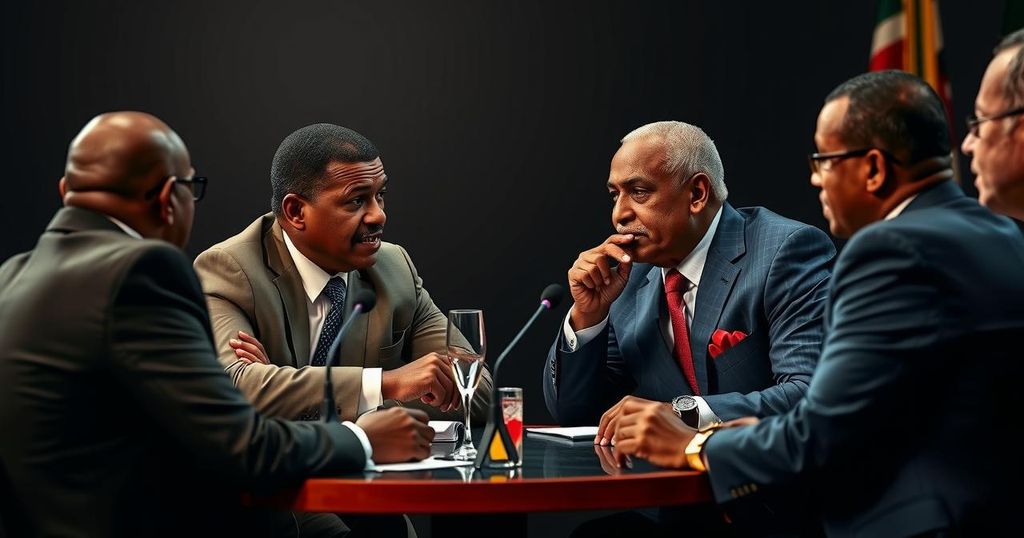Kenyan Political Leaders Respond to the Impending Conclusion of the U.S. Presidential Race

The 2024 U.S. presidential election, with Donald Trump leading Kamala Harris, has prompted varied reactions from Kenyan leaders. Ndindi Nyoro supports Trump, citing benefits for Africa, while Kalonzo Musyoka emphasizes democratic processes. Other leaders express political aspirations and reflections on governance, showcasing the election’s global significance, especially for Kenya.
As the 2024 United States presidential election approaches its climax, it has drawn considerable global interest, particularly from leaders in various countries, including Kenya. Presently, Republican candidate Donald Trump holds a commanding lead with 267 electoral votes, moving close to the crucial threshold of 270. Meanwhile, Democratic candidate Kamala Harris follows with 224 electoral votes. Should these trends persist, Trump is set for a return to the presidency, a position he previously occupied from 2017 to 2021. This election’s implications extend well beyond U.S. borders, prompting reactions from international statesmen and political factions around the world. Specifically, Kenyan leaders are attentively assessing the potential repercussions of the U.S. presidential race on their nation’s political landscape and economic prospects. Kiharu Member of Parliament Ndindi Nyoro, an ally of President William Ruto, has expressed unequivocal support for Trump, asserting that Republican administrations tend to produce more favorable conditions for Africa and the Global South. Nyoro posits that under a Trump administration, there may be opportunities for economic enhancement facilitated by expected changes in monetary policy. Conversely, Wiper Party leader Kalonzo Musyoka has opted for a more diplomatic stance, publicly congratulating the frontrunner while underscoring the significance of adhering to democratic principles. Nairobi Woman Representative Esther Passaris continues to champion Harris, commending the Vice President’s focus on substantive policy issues throughout her campaign. Alongside these reactions, Embakasi East MP Babu Owino has hinted at his own political ambitions for 2027 by leveraging the current election scenario, whereas Kirinyaga County Governor Anne Waiguru has skillfully acknowledged the contributions of both candidates to democratic processes. Former Nairobi Governor Mike Sonko has drawn comparisons between the political resilience displayed by Trump and his own experiences in governance. Furthermore, Kapseret MP Oscar Sudi emphasizes the need for tangible actions rather than mere rhetoric in political practice. Reflection of confidence in Trump’s victory is also evident in expressions from Murang’a Senator Irungu Kang’ata and former Law Society of Kenya President Nelson Havi, with Havi suggesting that past allegations of election fraud may have inadvertently bolstered Trump’s standing in the race.
The ongoing 2024 U.S. presidential election holds considerable weight on global politics and economics, largely due to the United States’ influential role in international affairs. Political leaders across the world, especially in Africa, are closely monitoring the electoral process and its potential impacts on their nations. The election serves not only as a reflection of American democracy but also as a catalyst for discussions on global governance, foreign policy, and international relations as various leaders prepare to engage with the prospective winner, emphasizing the interconnectedness of global politics.
In summary, the reactions of Kenyan leaders to the nearing conclusion of the U.S. presidential race illustrate the profound global implications of this election. With strong support for Trump from some quarters and a diplomatic acknowledgment of democratic values from others, the responses underscore diverse political sentiments. As the election unfolds, it is clear that the outcome will likely have far-reaching effects on Kenya and the broader African continent, particularly concerning economic policies and international relations.
Original Source: www.mwakilishi.com







